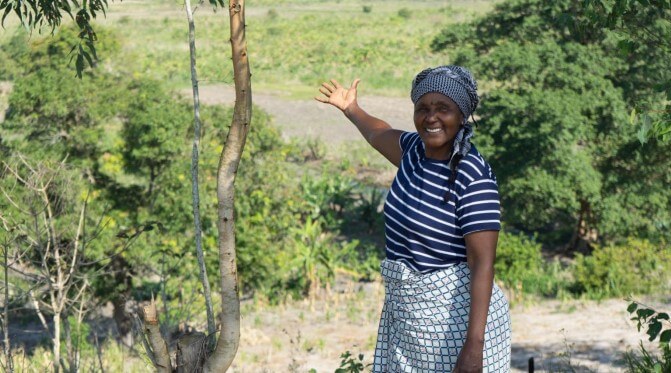Incorporating potential female sugar cane farmers in Mozambique into the sector isnIncorporating potential female sugar cane farmers in Mozambique into the sector isnner blog-post-copy py-4">
 “Don’t be scared, be strong; you can work in your field. Be ready and pay attention when projects arise. A lot of women miss opportunities because they are not aware of these types of programs.” – Magarida Ndimande (Pictured)
“Don’t be scared, be strong; you can work in your field. Be ready and pay attention when projects arise. A lot of women miss opportunities because they are not aware of these types of programs.” – Magarida Ndimande (Pictured)
Many women wish to farm, but “… are still vulnerable, especially when it comes to land rights,” says sugar cane grower and cooperative vice president of the Hluvukani Varime Cooperative at Maragra, Margarida Ndimande, who is referring to a DUAT (a formal land tenure right which is recognised by the Mozambique Government).
“Without a DUAT, the authorities cannot decide what to do with the land especially when their husband is abroad but keeps the rights to use the land. In other instances, if they become widows, they can lose all access to land if the family of the husband or even their eldest sons decide to claim their rights,” says Ndimande.
“The law in Mozambique protects women, but in rural areas the law enforcement is often poor and that is the role of associations to support women. If a woman’s right is usurped, the woman can go to the Cooperative to seek support and assistance,” she says. Hluvukani Varime is an umbrella organisation for several cooperatives and farmer associations, its Board has 12 members, 7 of which are women.
Behind the Cooperative was a formidable partnership between USAID and Illovo Sugar Africa that provided the support it needed to ensure that the DUAT’s are issued to female farmers.
Ndimande smiles as she talks about the 66% of land rights certificates that this partnership has helped deliver to women in the Maragra region, where Illovo Sugar Africa has a 90% share in Maragra Açúcar SA and which produces sugar from cane supplied by the company’s own agricultural operations and by an increasing number of local growers.
The effects of this partnership have been instrumental in uplifting the community. “Women are wiser in reinvesting their proceeds, we reinvest in education for our children. Now, we can already see our children are able to access higher education, some of them are studying in Maputo or even abroad, it makes us proud,” she says. Adding how her success has changed her life as well as that of her family.
“I didn’t expect to get the kind of income I now have. I can send my children to school and make proper plans. Now, my children are going to school, and I even have a retirement plan. I have electricity, I have installed potable water at my son’s place, and I have other projects. My next plan is to buy a car because I have recently obtained my driver’s license!” she says.
Nidmande’s advice to other women who want to farm, “Don’t be scared, be strong; you can work in your field. Be ready and pay attention when projects arise. A lot of women miss opportunities because they are not aware of these types of programs.”
Margarida Ndimande is one of many local community members to be involved in a recent and multidimensional “EU-funded project” to establish new areas of land to cane, for delivery to the nearby Maragra sugar factory, and to food crops. The project included building the capacity of the local sugarcane farmers associations and management organisations to sustainably improve production and income levels.